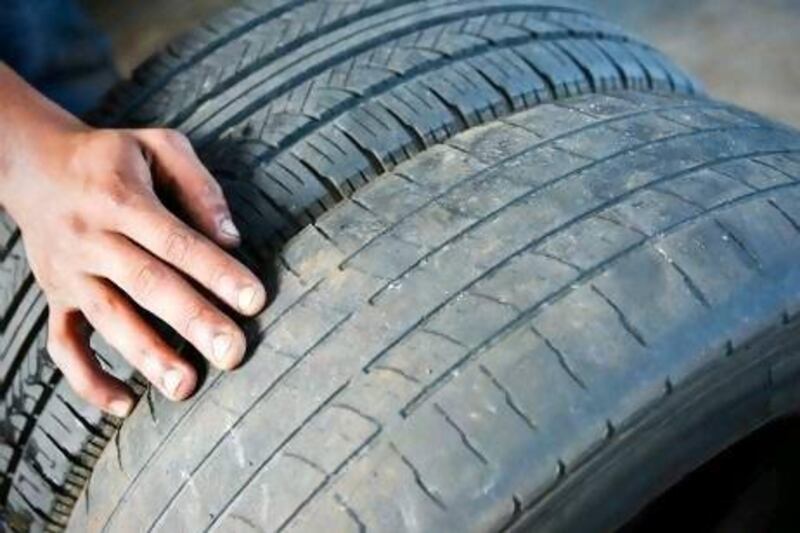The Motoring section, as you might imagine, receives a constant stream of emails from car companies and PRs from all over the world, all wanting one thing: exposure in these pages. But we're not in the business of providing free advertising, nor are we the type to simply regurgitate press releases to fill up the section every week.
This doesn't mean we ignore everybody, but it does take something exceptional to warrant our interest. And we think the email received from a certain Dennis Montgomery a couple of weeks ago is worthy of everyone's attention.
Montgomery is the sole distributor in the UAE of a unique product called TyreSafe. Every now and then, we have a bit of a rant about tyre safety because people needlessly die on our roads. Because their tyres aren't up to scratch, either worn out or having been sourced from spurious suppliers. Cutting corners to save money is the ultimate false economy when it comes to the round, black rubber bands we have stretched around our wheels, and we see the results of exploding tyres every day during the UAE's summers. Surely anything at all which can help reduce the likelihood of a blowout should make us sit up and take notice.
"We all spend so much time cleaning, polishing and adding on 'extras' to our cars," says Montgomery, "and most of us forget one thing: our tyres." He's right and most of us are guilty of neglecting to check ours weekly, monthly or even annually, only reacting to a "fail" when it comes to re-registering our cars.
Tyre companies are in the business of making money, so any product that effectively reduces the chance of getting a puncture won't be shouted about by them from the rooftops. Yet that is exactly what TyreSafe does; it prevents sudden air pressure loss, either due to something penetrating the tyre or through general wear.
It's basically a sealant installed via the tyre pressure valve, where you normally inflate with air (or maybe you don't). Only it isn't like the foam that you can squirt in after a puncture - something that often doesn't work anyway. Rather, it's pumped into the tyres before any damage is sustained. To install it takes no more than 20 minutes for all five tyres (might as well do the spare while you're at it) and, as each tyre is rotated, the centrifugal forces disperse the latex-free gel around the inner tread area, forming an immensely strong bond with the surface.
In theory and, crucially, in practice, what happens is that when something like a nail or piece of glass punctures the tread area, this gel is drawn by the air inside the tyre to the wound and it seals it. In a millisecond. Properly installed, the sealant is good for hundreds of literally instant puncture repairs.
Sceptical? Of course - we were, too. So, to prove his point, Montgomery gets into his Dodge Durango in Dubai, on the Palm Jumeirah, and proceeds to drive it over a plank of wood which has three serious looking nails protruding from it. The nails go through the surface of his front, driver's side tyre, like three hot knives through butter, and the result is no air loss whatsoever, evidenced by the pressure gauge he whips out. Amazing stuff.
It's a permanent seal and takes care of holes up to 6mm in diameter, which is probably a larger area than you think. "Apart from taking care of punctures, the sealant also extends the lifespan of your tyres and doesn't harm any warranty provided by the manufacturers," he says. "And, because the pressures are constantly maintained, you get better fuel economy and better wear from them. It actively dissipates the high temperatures that build up inside the tyres, too, which is the most obvious benefit here in the Middle East."
A tyre that gives up the ghost when we're travelling at speed can be deadly and, at the very least, it will be a major inconvenience. The thought of changing a wheel on the side of the road when the thermometer is showing 50°C is enough to make most of us wince.
As if the previous demonstration isn't convincing enough, Montgomery attacks the tyre by hammering a nail into one of its deep grooves. Again there's no pressure loss whatsoever.
"It's totally biodegradable, rinsing away with water if you decide to change your tyres, so it doesn't even harm the environment," he says finally. We're not really worried about that, to be honest. We're just keen to get it fitted in our own Pirellis, so what does it cost and how do we get it done?
"We're just about to start appointing mobile installation units," says Montgomery, "and Abu Dhabi will be the first area to offer the service in the Middle East. Installation centres will be opening for business in October and we'll be announcing other regions very soon."
As for the price, that understandably varies according to the size of your tyres, but he says it'll start at around Dh125 per tyre for a small car. At this price it should be a legal requirement.






